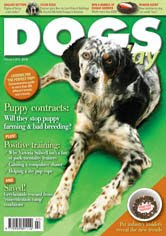Blake is an eight-year old Lab x Golden Retriever and has just had to have major surgery to release a build up of gas in his stomach and intestines. This is the second time this has happened, the first being two years ago.
He has two meals a day of Chappie Complete as recommended by my vet and is not allowed to exercise before or after meals. He is a fit and active dog, weighing 32kgs and has no other health problems.
Can you suggest what might be causing this?
Is there anything I can do to prevent it happening again?
Is surgery the only option? In the latest operation the gas was removed with a stomach tube, did he need to be opened up for this procedure?
I would be grateful for any advice.
Helen Lane, by email
Also posted on Think Tank
Hi Helen,
My James (StaffiexLurcher) is prone to bloat so I understand your feelings of frustration and worry.
The technical name for bloat is Gastric Dilatation-Volvulus (GDV) and usually happens when there's an abnormal accumulation of air, fluid, and sometimes food in the stomach. As the stomach swells, it may rotate 90° to 360°, twisting between its fixed attachments at the esophagus and at the duodenum.This twisting traps air, food, and water in the stomach while the bloated stomach itself obstructs veins in the abdomen, leading to low blood pressure, shock, and damage to internal organs.
There are lots of reasons for the onset of bloat which may include some or all of the following:
1. Eating Habits: Eating too quickly, drinking too quickly, eating foods high in fat,eating dry food, eating gas producing foods such as those containing soya or brewer's yeast products - may all contribute.
2. Exercise: Even moderate exercise one hour before or two hours after a meal may trigger an episode.
3. Build/Physiology: Deep chested breeds, older dogs and male dogs are all prone to bloat more than others.
4. Stress: Anxiety, nerves or a change in circumstance can also be contributing factors.
5. Heredity: Unfortunately, some dogs regardless of breed are just more susceptible to bloat than others, especially those that have close relatives who also suffer from the same problem. If you haven't done so already, it would be a good idea to have Blake checked for Exocrine Pancreatic Insufficiency (EPI), which occurs when the part of the pancreas that produces digestive enzymes no longer functions properly. Although it's not a very common aliment, it would be worth exploring the possibility with your vet.
Managing bloat usually involves incorporating lots of small changes to diet and daily routine. One of which is moving from dry food to tinned or perhaps consider feeding Blake a Natural Diet. As your vet has recommend Chappie, let me just say that in my experience, Chappie has suited dogs with all manner of digestive complaints, so if your vet is happy with the move from dry to tinned I would go down that route first. Although there is nothing intrinsically wrong with dry kibble, it can swell in the stomach and is never normally advised for dog's prone to bloat.
Feeding Blake from a raised bowl may slow him down, but the jury is still out as to weather or not it will have an effect in preventing bloat. I work with several vets who feel that feeding from a raised bowl actually does more harm than good, but I also work with some who highly recommend them. Regardless of your decision, it's a good idea to split Blake's current two meals a day into three with that third being offered in a puzzle toy such as a Kong or similar. This will help to slow him down, as well as engage his mind. If you do switch to tins, try not to mash his food up in his bowl but leave it in largish chunks so that he needs to chew his food before swallowing. The very act of chewing triggers the production of digestion enzymes which in turn will help him digest his food properly.
Thinking outside the box, you may wish to look into Canine Massage Therapy if you feel stress may be playing a part in Blake's condition. My James has a bi-weekly session in order to help manage his back problem, but I've also found that since starting the regime he is much more relaxed and we haven't had any major issues with his digestion. If you do decide to give Massage Therapy a try, make sure you find someone who is properly qualified and is happy to work with your vet (ie provide professional reports etc).
If all of the above do not address Blake's issue, then you may need to consider surgery. Laparoscopic assisted gastropexy is an operation that fixes the stomach to the body wall permanently in order to prevent the twisting of the stomach. However, since no operation should be considered lightly, a full and frank discussion of the pros and cons for Blake should be had with your vet.
Claire Goyer
Stay up to date with all the latest Haslemere Pet Company news by following us on Twitter: http://twitter.com/HaslemerePetCo
The Haslemere Pet Company
13 High Street
Haslemere, Surrey
GU27 2HG
tel: 01428 643 279
email: haslemerepets@gmail.com
www.haslemerepets.com







1 comment:
Have you tried a grain free diet such as Orijen Dog Food, or Acana.
Also as a high protin food you feed less leading to less build of food in dogs stomach. Orijen also do a senior variety which might be more appropriate.
Fraser @ mutley and mog.
Post a Comment